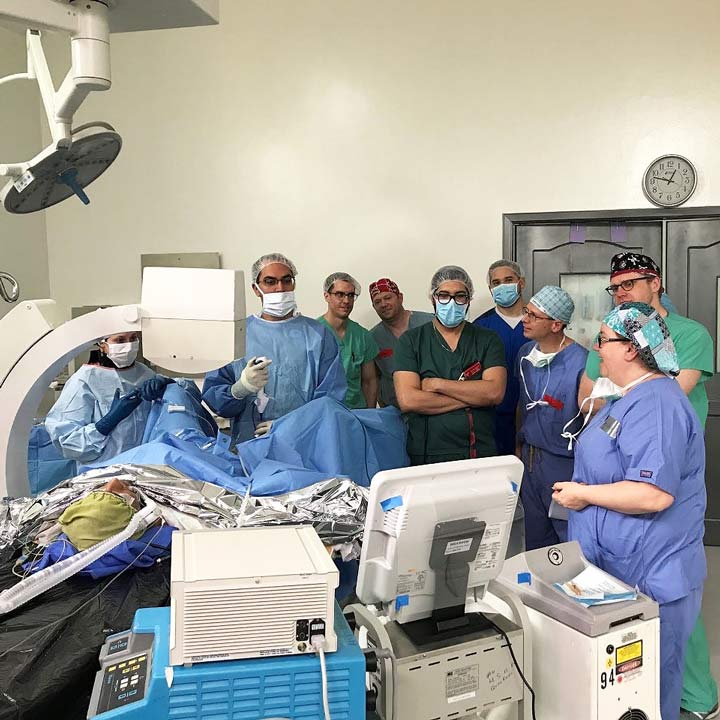 Urology residents and fellows can access expanded global health experiences at The Ohio State University Wexner Medical Center, thanks to a recent scholar exchange program and a grant from the Arnold P. Gold Foundation.
Urology residents and fellows can access expanded global health experiences at The Ohio State University Wexner Medical Center, thanks to a recent scholar exchange program and a grant from the Arnold P. Gold Foundation.
These efforts provide improved care to underserved urology patients around the world through surgical missions, according to Michael Sourial, MD, director of Global Health in the Department of Urology.
A residency learning opportunity
Current urology residents at The Ohio State University College of Medicine are presented the opportunity to participate in an international global health experience. Dr. Sourial participates in an annual medical mission trip to Hospital San Hermano Pedro in Catacamas, Honduras, as part of a multi-institutional, week-long effort to provide urologic care and medical supplies donated by Boston Scientific, to an underserved community, with a focus on benign urologic diseases, specifically benign prostatic hyperplasia and urolithiasis. A resident accompanies him, annually, to participate in this meaningful international experience.
Learning new skills in Brazil
Dr. Sourial recently completed the American Urological Association – Sociedade Brasileira de Urologia (SBU) Exchange Scholar Program, where he spent two weeks and attended the 2023 SBU National Congress in Salvador, Brazil.
His clinical practice focuses primarily on complex surgical management of kidney stones, and he has published on clinical outcomes related to stone disease. He applied for the SBU exchange to expand his knowledge, collaborate with colleagues from across the globe and expand participation in the mission trips to Honduras.
In Brazil, Dr. Sourial networked with international colleagues, cared for patients and gained experience with equipment used uncommonly in the U.S. for the treatment of urinary calculi.
“One of the biggest take- aways for me was the use of ultrasound in certain stone procedures,” he says. “In Brazil, urologists are very conscious about radiation safety, and they work to reduce the use of radiation and x-rays in every step during surgery. The use of ultraonagraphy is a great alternative.”He observed and practiced using an ultrasound simulator under the guidance of Fabio Sepulveda, MD.
Ultrasound is increasingly used in the United States to provide guidance during stone procedures. It also can facilitate a safe entry point into the kidney for selected patients.
Since returning from Brazil, Dr. Sourial has used ultrasound on some patients with good results. For example, if a patient has a very large liver that sits close to the kidneys, ultrasound can help determine if there is a safe amount of space to enter into the kidney and treat the stone.
Global experiences close to home
Residents in urology and many other specialties can interact with a culturally diverse patient population without easy access to specialized health care right in Columbus. Once a month, a resident and an attending physician see patients in the Physicians CareConnection community clinic.
The work is partially funded by Picker Gold Challenge Grant for Residency Training from the Arnold P. Gold Foundation awarded to Tasha Posid, PhD and Cheryl Lee, MD. Dr. Posid is an education specialist, researcher and Assistant Professor in the Department of Urology.
Clinic patients speak a variety of languages including Spanish and Somali while facing several barriers to care. In treating patients at the community clinic, residents increase their cross-cultural communication skills and gain new awareness and problem-solving experience.
The chance for students to “gain global experiences” close to home is driving interest in traveling elsewhere on mission trips, Dr. Sourial says.
For the first time, Dr. Sourial took a resident along on the Honduras mission trip in 2023. Plans call for taking another resident in 2024.
Medical missions drive global health efforts across campus
His own medical mission trips led Dr. Sourial to build global health efforts across the Ohio State campus. During residency, he traveled to Burkina Faso and Rwanda, where he helped provide pediatric urologic care and treat women living with obstructive fistulas.
Dr. Sourial came to Ohio State as a fellow studying kidney stone disease in 2016. In 2017 he took part in his first mission trip to Honduras, led by retired urologist Frank Begun, MD, and colleagues at the Medical College of Wisconsin and the University of Kansas.
Each year, the group treats many patients, including some who have been dependent on catheters for years. The trips build strong relationships with colleagues in Honduras and provide equipment to treat symptomatic kidney stones. Dr. Sourial says they continually look for ways to improve stone management.
“Those early trips really meant a lot to me. The work we did helped bring people back to life,” Dr. Sourial says. “It was something I wanted to continue in my practice, and I wanted other residents to have the experience.”
